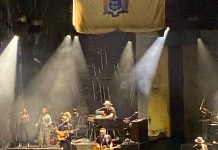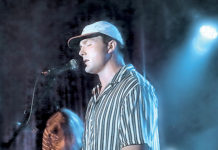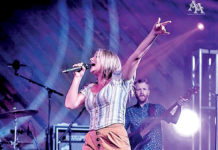By Jennifer Lieberman
The final segment of a three-part series on Muslim traditions and cultures was held Saturday at Monmouth University, West Long Branch. The program, “Caravanserai; A Place Where Cultures Meet,” is a national program designed to introduce audiences to the Muslim world and create a better understanding through the use of art and music.

In Eastern and mid-Eastern cultures, a caravanserai is a place where travelers can stop, rest, exchange stories and find companionship and entertainment. Launched in 2010 by Arts Midwest, Caravanserai is funded through a $1 million grant from the Doris Duke Foundation for Islamic Art. Monmouth University successfully applied to be one of five organizations in the U.S. to participate in Caravanserai’s pilot program, which focused on the music and film of Pakistan.
The series opened with a performance by Tari Khan, a percussionist and master of the “Tabla” drum, and Qawal Najmuddin Saifuddin & Brothers, an ensemble that carries on the tradition of mystical Sufi devotional singing at the university’s Pollak Theatre.
Next was a screening of Made in Pakistan, a documentary directed by filmmaker Ayesha Khan.
Saturday’s performance featured Pakistani folk singers Arif Lohar and Arooj Aftab, both from the Punjab region of Pakistan that borders India and is located near five converging rivers. Prior to the performance, the musicians held several workshops at area schools where they showcased their musical traditions. Students learned the significance of the songs and the instruments they play, including an Alghoza, two instruments resembling a flute that are played together using circular breathing.
Vaune Peck, counselor and coordinator of arts programming and promotion at the university, said that she has worked closely with the artists throughout the performances and workshops and said the students were very receptive to the music, particularly the younger students. It’s been “unbelievably rewarding and exhilarating,” to work with Arif Lohar, Peck said, as she commented on his charisma and warmth.

Lohar, the son of legendary folk singer Alam Lohar, has been performing folk music for over 20 years and is considered a legend in his own right. He has made over 150 albums and was awarded the Pride of Performance Award by the government of Pakistan. He carries on the legacy of his father and the history of Punjabi folk music by traveling the world and introducing audiences to the “Chimta,” a percussion instrument that produces a metallic sound and keeps with the beat of the song. While preparing for the evening’s show he expressed that, “an artist, through his art, communicates what represents his culture and creates pathways for connections between people and cultures.”
Lohar’s son, four-year-old Ali, is already following in the footsteps of his father and grandfather. He wowed an audience of his peers during the workshops, where he was so well received that the children chanted “Ali! Ali!” at the closure of his performance. Zeyba Raham, artistic director of the Caravanserai said that his performance, “really reinforced the connection between the children.”
Ali also took control of the Pollak Theatre stage during the concert, raising his tiny hands and directing the musicians to start and stop playing upon his command.
Aftab, who studied at the Berklee College of Music in Boston, said she was amazed at the response Caravanserai received at the workshops. She related to the children as she recalled some of her first experiences with people from other cultures, which she described as, “strange and colorful.”

Onstage, she was accompanied by guitarist Bhrigu Sahni, whom she met while they were both students at Berklee. Their musical friendship is one they hold especially dear since she is from Pakistan and he is from India, two countries in conflict. Both feel that music is a way to reach people, “music goes straight to the heart, “said Sahni.
Aftab opened the performance with the traditional Muslim greeting “As-Salāmu Alaykum” (Peace be with you). She explained that the performance would, “transcend the mystical realm of oneness.” Her vocals, sung in Urdu, were melodic and consistent with traditional Pakistani folk music, but influenced by other genres such as jazz and pop. Sahni’s guitar added a soft elegant sound creating a perfect fusion.

Lohar and his band performed a more upbeat ensemble with heavy drum rhythms, including “Jugni Ji” which means “firefly”, a song that is considered highly spiritual. The performance moved the audience to their feet as they headed to the stage to raise their hands in praise. Some in the audience who were originally from Pakistan were honored to see a performance by a man they had admired since childhood.
Audience member Tehmina Brohi said, “I was born in Pakistan and this is an opportunity for me to connect with my culture.”
Others, experiencing Pakistani folk music for the first time, were equally moved. Neptune High School student Justin Jones said he did not have any preconceived ideas about Pakistani culture or music but, “the music was pretty incredible.”
Although this was the last performance of the Caravan Serai at the Pollak Theatre, the performers will introduce their music to various communities throughout the U.S. On April 27 they will perform at the Asia Society in New York.
For more information about the Caravanserai visit www.caravanserai-arts.org.














